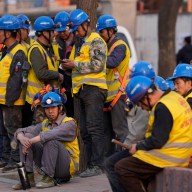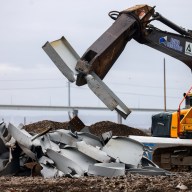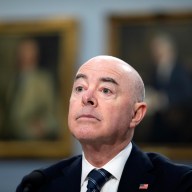 Elizabeth Warren addresses a group at a a 25-state national bus tour sponsored by Mayors Against Illegal Guns. CREDIT: Nicholaus Czarnecki
Elizabeth Warren addresses a group at a a 25-state national bus tour sponsored by Mayors Against Illegal Guns. CREDIT: Nicholaus Czarnecki
As gun violence continues to tear families apart throughout the Boston area, residents and politicians are uniting to combat the epidemic that has seen a drastic upsurge in the last year.
According to statistics provided by the Boston Police Department, between Jan. 1 and Aug. 26 there have been 25 homicides with firearms in the city of Boston, along with 160 non-fatal shootings. These numbers demonstrate an increase from 2012’s statistics during the same time period, which showed 21 homicides with a firearm alongside 164 non-fatal shootings. Gun violence is a widely recognized problem, but finding a solution has proven elusive.
In recent weeks, the city has frequently convened to address the issue. At a Sept. 13 legislative hearing, Suffolk County District Attorney Dan Conley spoke of targeting violence from the angle of those who sell firearms, rather than focusing on just those who carry them illegally. In “An Act to Combat Gun Violence,” Conley proposed 26 different changes to state law, including a 2.5-year minimum sentence for unlawfully selling a firearm and forbidding felons from employment or volunteer positions with licensed firearms dealers.
“We in Massachusetts have to redouble our own efforts and do the work that Washington refused to do,” said Conley.
Those efforts include several campaigns, like the No More Names: National Drive to Reduce Gun Violence, a 25-state national bus tour sponsored by Mayors Against Illegal Guns. Urging leaders to support stronger background checks for gun buyers, the tour landed in Faneuil Hall in late August and featured speeches by Elizabeth Warren, Mayor Thomas Menino and Edward Markey. Also present were those whose lives have been tragically affected through gun violence.
Rev. Kim Odom, who lost her 13-year-old son Steven to gun violence in 2007, expressed her mission to the crowd. “I have vowed that his life does not end on the sidewalk, and his death will not be in vain. Where did the gun come from that took my child’s life? Where are the guns coming from that are taking the lives of our loved ones?”
Another campaign seeks to mobilize the struggling Mattapan community from the inside out. Just a little more than two weeks ago, the city unveiled a grant-funded campaign in Mattapan that features 12 residents personally impacted by gun violence. Called “Our Mattapan. Many Pasts. One Future,” the campaign features everyone from Mattapan residents to local police officers speaking about their love for the neighborhood.
“We came up with this campaign here where we not only engaged with residents to target violence, but also used their words. We spoke with them, did interviews and produced videos,” said Boston Public Health Commission Social Media Coordinator McKenzie Ridings. “The posters are displayed throughout Mattapan – in bus shelters, on the MBTA and on the sides of buses to reinforce the message that this is our Mattapan, but we’re also trying to take it back and even though there may have been multiple cases of gun violence, we can change the future.”
The Massachusetts Coalition to Prevent Gun Violence formed in the wake of the Sandy Hook shootings in December 2012. An umbrella group of more than 30 anti-gun organizations, the group has had a strong presence at recent rallies and legislative meetings.
“Gun violence kills more than 30,000 Americans every year, including 2,800 children and teenagers,” said Ann Krantz, co-leader of the Massachusetts Chapter of Moms Demand Action for Gun Sense in America, a member group within the MCPGV.
The coalition is made up of more than 30 organizations working together to pass stronger gun laws at the state and federal levels. They advocate background checks for gun purchases at all levels, including private sales. They also propose serious measures to address gun trafficking, the primary source of gun crimes in Massachusetts, and seek stronger penalties for the trafficking of firearms and for failure to report lost and stolen guns.
And while they may not know now to specifically attack the problem successfully, leaders in the city’s government are at the point where they recognize the problem must be addressed.
“The opposite of violence isn’t peace, it’s opportunity,” said City Councilor Mike Ross recently at an event in Dorchester. “I don’t believe that any one of us has all the answers, but that all of us, together, do.”
Read more on Boston’s gun violence here: Deadly gun violence in Boston sees rising numbers in 2013
Gun Week: Following the trail of our bloody streets
Boston, Philadelphia, New York City: Three very different cities with a common problem. Gun violence has destroyed the lives of countless individuals and families on our streets and wrought devastation across vibrant neighborhoods, searing itself into their fabric.
Over the next week, Metro will examine the impact that gun violence has had on those cities as well as our country in the aftermath of the recent massacres at Sandy Hook Elementary, Aurora, Co. and the Washington, D.C. Navy Yard. We will look at what each city and the country is doing to combat the age-old problem as well as change the deadly culture that, on a daily basis, leaves its bloody imprint on our communities. – The Editors














